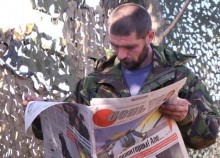Den’s publisher has been delivering copies of the newspaper to the front, particularly to Luhansk region, three times a week, for four months already. It is assisted in this distribution effort by Starobilsk NGO Freedom, which delivers the papers to National Guardsmen, who transport them to checkpoints then. Den has recently reappeared in the liberated areas of Donetsk region as well. The copies first come to the ATO headquarters in Kramatorsk, where they are carefully read and then given to various battalions who bring them to their checkpoints. “The all-Ukrainian daily Den is read till it is frayed, as well as passed from one soldier to another in the ATO area. You are doing a valuable job, Larysa Ivshyna. The soldiers serving at the headquarters thanked you for the latest newspapers which are delivered to the front,” journalist of the Ukrainian Greek Catholic Church’s Internet TV channel Zhyve.tv Valentyn DIHTIARENKO wrote in his posting on Facebook following a filming trip to Kramatorsk. Den asked Dihtiarenko to tell more about newspaper “menu” at the headquarters and the contributions which find most ready readers at the front.
“I saw first-hand that as soon as the newspapers were delivered to the headquarters, a soldier immediately took a copy of Den and began to browse through the newspaper,” the journalist told us. “A variety of publications are brought to the HR department, and from there, they are distributed onwards. In fact, every newspaper finds its consumer. Men complain of press shortages at the front and regret newspapers having low circulation. The handful of papers that I saw personally was about 10 centimeters thick per title, which is clearly too little. The same day, men from various battalions came there to take delivery of the fresh press shipment and bring it back to their comrades, so the major had to divide newspapers between units, determining who gets what. For a person who is constantly online via a smartphone or an Internet-connected computer, it is amazing to see newspapers in so high demand. The soldiers always ask if there is a fresh issue to read and browse through. They read, first of all, contributions dealing with the ATO, themselves and civic volunteers, and are very sensitive to this information. They keep the track of the news ‘from the mainland.’ Some newspapers have left the frontline soldiers unpleasantly surprised. I remember well seeing Komsomolskaya Pravda and Segodnya among the newspapers delivered... Government-published Holos Ukrainy was there too, but the laws it publishes, written in bureaucratese as they are, are unlikely to find a reader at the front. I do not know if the soldiers understand the difference between Segodnya and Den, but if they read Den at all, it is good enough for me. In a private conversation with the soldiers, I tried to explain it to them. Spiritually, these people are true patriots. However, the soldiers often avoid talking on camera for many reasons. Some are afraid for their lives and those of their loved ones, some again dislike publicity. We met a former naval officer who had submitted a report asking the commanders to bring him out of Crimea. Previously, he served in the navy, but he has now become a land force officer. His whole family has stayed on the peninsula and virtually disowned him, except for his wife. Another serviceman has all his relatives living in Luhansk, and neither his mother nor sister understands his choice. Still, he sticks to his pro-Ukrainian position... I came from the front filming trip with the understanding that all these global events are happening against the backdrop of thousands of human stories, and each of them involves a difficult life choice.”







